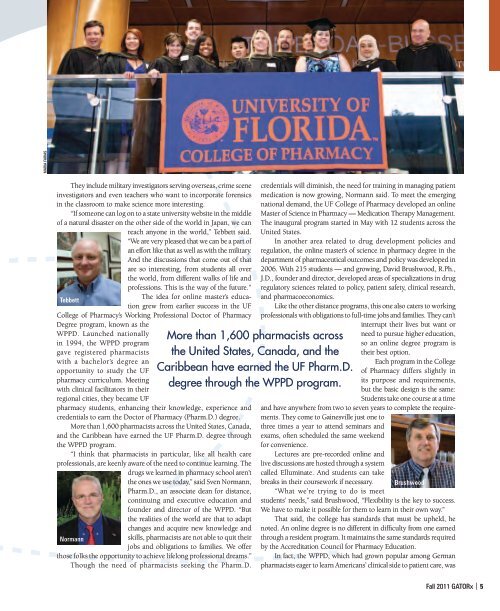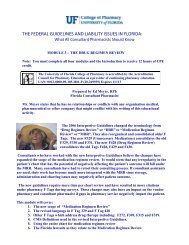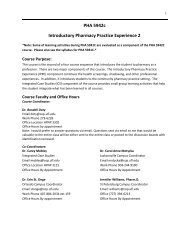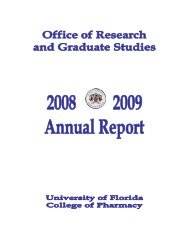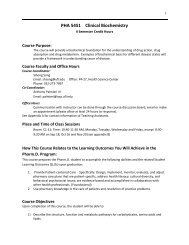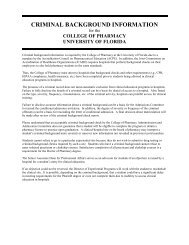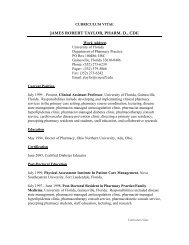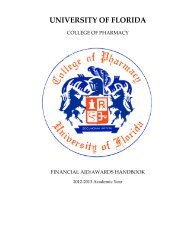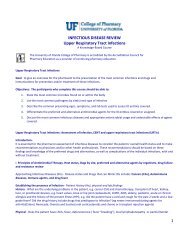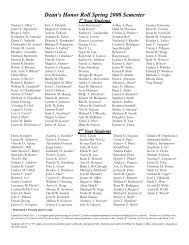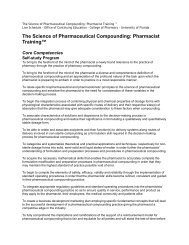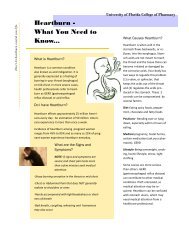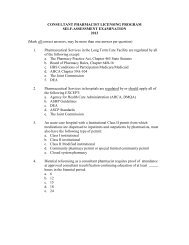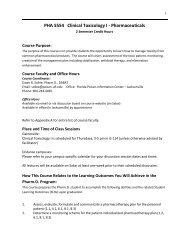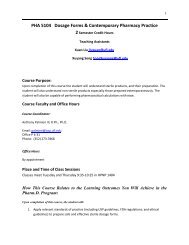Hospital Safety - College of Pharmacy - University of Florida
Hospital Safety - College of Pharmacy - University of Florida
Hospital Safety - College of Pharmacy - University of Florida
You also want an ePaper? Increase the reach of your titles
YUMPU automatically turns print PDFs into web optimized ePapers that Google loves.
MARiA FARiAS<br />
They include military investigators serving overseas, crime scene<br />
investigators and even teachers who want to incorporate forensics<br />
in the classroom to make science more interesting.<br />
“If someone can log on to a state university website in the middle<br />
<strong>of</strong> a natural disaster on the other side <strong>of</strong> the world in Japan, we can<br />
reach anyone in the world,” Tebbett said.<br />
“We are very pleased that we can be a part <strong>of</strong><br />
an effort like that as well as with the military.<br />
And the discussions that come out <strong>of</strong> that<br />
are so interesting, from students all over<br />
the world, from different walks <strong>of</strong> life and<br />
pr<strong>of</strong>essions. This is the way <strong>of</strong> the future.”<br />
The idea for online master’s educa-<br />
Tebbett<br />
tion grew from earlier success in the UF<br />
<strong>College</strong> <strong>of</strong> <strong>Pharmacy</strong>’s Working Pr<strong>of</strong>essional Doctor <strong>of</strong> <strong>Pharmacy</strong><br />
Degree program, known as the<br />
WPPD. Launched nationally<br />
in 1994, the WPPD program<br />
gave registered pharmacists<br />
with a bachelor’s degree an<br />
opportunity to study the UF<br />
pharmacy curriculum. Meeting<br />
with clinical facilitators in their<br />
regional cities, they became UF<br />
pharmacy students, enhancing their knowledge, experience and<br />
credentials to earn the Doctor <strong>of</strong> <strong>Pharmacy</strong> (Pharm.D.) degree.<br />
More than 1,600 pharmacists across the United States, Canada,<br />
and the Caribbean have earned the UF Pharm.D. degree through<br />
the WPPD program.<br />
“I think that pharmacists in particular, like all health care<br />
pr<strong>of</strong>essionals, are keenly aware <strong>of</strong> the need to continue learning. The<br />
drugs we learned in pharmacy school aren’t<br />
the ones we use today,” said Sven Normann,<br />
Pharm.D., an associate dean for distance,<br />
continuing and executive education and<br />
founder and director <strong>of</strong> the WPPD. “But<br />
the realities <strong>of</strong> the world are that to adapt<br />
changes and acquire new knowledge and<br />
Normann<br />
skills, pharmacists are not able to quit their<br />
jobs and obligations to families. We <strong>of</strong>fer<br />
those folks the opportunity to achieve lifelong pr<strong>of</strong>essional dreams.”<br />
Though the need <strong>of</strong> pharmacists seeking the Pharm.D.<br />
More than 1,600 pharmacists across<br />
the United States, Canada, and the<br />
Caribbean have earned the UF Pharm.D.<br />
degree through the WPPD program.<br />
credentials will diminish, the need for training in managing patient<br />
medication is now growing, Normann said. To meet the emerging<br />
national demand, the UF <strong>College</strong> <strong>of</strong> <strong>Pharmacy</strong> developed an online<br />
Master <strong>of</strong> Science in <strong>Pharmacy</strong> — Medication Therapy Management.<br />
The inaugural program started in May with 12 students across the<br />
United States.<br />
In another area related to drug development policies and<br />
regulation, the online master’s <strong>of</strong> science in pharmacy degree in the<br />
department <strong>of</strong> pharmaceutical outcomes and policy was developed in<br />
2006. With 215 students — and growing, David Brushwood, R.Ph.,<br />
J.D., founder and director, developed areas <strong>of</strong> specializations in drug<br />
regulatory sciences related to policy, patient safety, clinical research,<br />
and pharmacoeconomics.<br />
Like the other distance programs, this one also caters to working<br />
pr<strong>of</strong>essionals with obligations to full-time jobs and families. They can’t<br />
interrupt their lives but want or<br />
need to pursue higher education,<br />
so an online degree program is<br />
their best option.<br />
Each program in the <strong>College</strong><br />
<strong>of</strong> <strong>Pharmacy</strong> differs slightly in<br />
its purpose and requirements,<br />
but the basic design is the same:<br />
Students take one course at a time<br />
and have anywhere from two to seven years to complete the requirements.<br />
They come to Gainesville just one to<br />
three times a year to attend seminars and<br />
exams, <strong>of</strong>ten scheduled the same weekend<br />
for convenience.<br />
Lectures are pre-recorded online and<br />
live discussions are hosted through a system<br />
called Elluminate. And students can take<br />
breaks in their coursework if necessary. Brushwood<br />
“What we’re trying to do is meet<br />
students’ needs,” said Brushwood, “Flexibility is the key to success.<br />
We have to make it possible for them to learn in their own way.”<br />
That said, the college has standards that must be upheld, he<br />
noted. An online degree is no different in difficulty from one earned<br />
through a resident program. It maintains the same standards required<br />
by the Accreditation Council for <strong>Pharmacy</strong> Education.<br />
In fact, the WPPD, which had grown popular among German<br />
pharmacists eager to learn Americans’ clinical side to patient care, was<br />
Fall 2011 GATORx | 5


